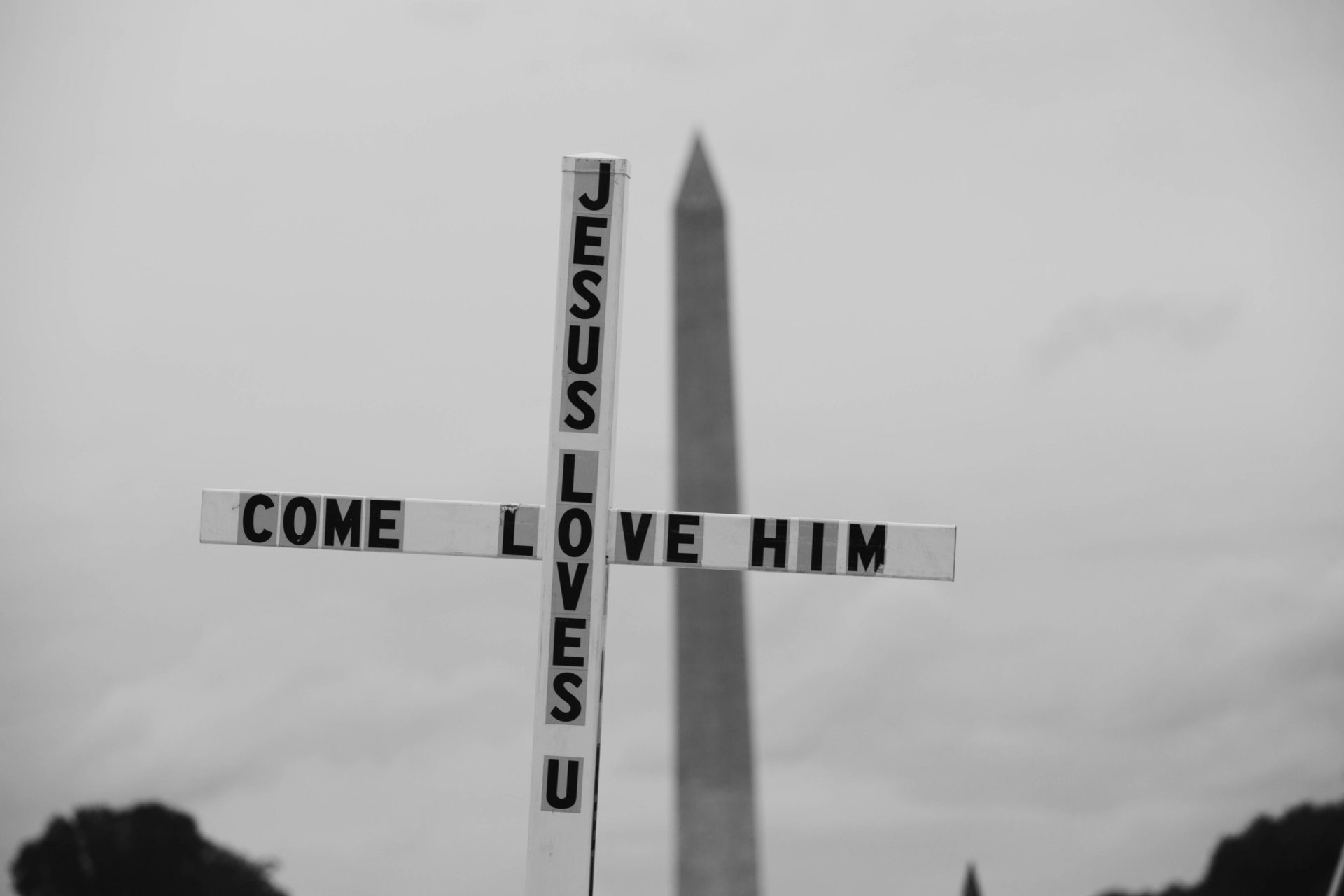
In 2016, around 8 in 10 white evangelical voters chose Trump and became a key bloc of voters that were critical to his victory. Four years later, that number held steady. Despite Trump’s defeat, sixty percent of white evangelicals believe the 2020 election was stolen, and of those, 39% say “true American patriots might have to resort to violence to save our country.” We also know that white evangelicals have a penchant for nationalism, nativism, and authoritarian populism; they show a preference for rejecting political compromise, for strong, solitary leadership, and for breaking the rules when necessary.
Yet, as Peter Wehner noted recently in The Atlantic, white evangelicals are divided among themselves. On the one hand, figures like Sean Feucht, Greg Locke, Franklin Graham, and John Hagee routinely grab headlines for their vocal support for Trump, occasional peddling in conspiracy theories, and frequent opposition to public health mandates. On the other hand, prominent evangelicals such as David French, Russell Moore, Beth Moore, and Wehner himself continue to push back against evangelical capitulation to Trump and wholescale alignment with reactionary politics.
The majority of white evangelicals can be found somewhere between these two positions. How “moderate” evangelicals respond to escalating threats to democracy may well play a decisive role in determining the fate of American democracy but deciphering which way evangelical moderates will fall is no easy task.
To begin with, many evangelicals and their defenders insist on downplaying the centrality of politics. Evangelicalism, they contend, is a movement defined chiefly by its theology, and evangelicals themselves are “salt of the earth” individuals who give generously to charitable causes, care for their local communities, and too often have been “demonized” by scholars and the media. As such, they should not be “unfairly stereotyped, lumped together in the basket of deplorables with the neo-Nazi marchers in Charlottesville and other supremacists.”
Most white evangelicals were not marching with neo-Nazis in Charlottesville. Nor were most evangelicals storming the Capitol on January 6. Yet underlying affinities make it difficult for many mainstream evangelicals to unequivocally condemn these acts.
Indeed, in many cases, the kinder, gentler version of evangelicalism has proven to be fully compatible with the movement’s authoritarian tendencies. Mirroring evangelical gender ideals that champion rugged, patriarchal leadership to guide and protect gentle, vulnerable women, the softer version of the faith requires the protection of a harsher, more aggressive strand. The two go hand in hand. Insisting that the gentler version is “true” evangelicalism obscures this dynamic while giving cover to more dangerous elements.
One of the central themes I explore in Jesus and John Wayne: How White Evangelicals Corrupted a Faith and Fractured a Nation is a connection between evangelicalism’s more extreme expressions and its more “respectable” representatives. I found deep affinities between the rigid patriarchy and social hierarchies advanced by an “outlier” like Bill Gothard, and the patriarchal family values promoted by an indisputably mainstream figure like James Dobson. I saw how respected leaders like John Piper and organizations like Christianity Today platformed unapologetic racists like Doug Wilson, and how the abusive and misogynistic behavior of pastors like Mark Driscoll was excused or tacitly condoned by the same, if not openly celebrated. Misogynists, abusers, and racists were defended as “brothers in Christ,” as allies in a larger cause.
Yet evangelicals rarely hesitated to draw stark boundaries around orthodoxy to the Left. When evangelicals such as Jen Hatmaker or Rachel Held Evans moved to the Left on issues related to gender and sexuality, they quickly found themselves excluded from the fold by evangelical gatekeepers.
The boundaries of evangelicalism are policed both by prominent organizations – such as the Southern Baptist Convention and The Gospel Coalition, for example – and by the evangelical marketplace. Although evangelicals like to claim that they are defined by their theology, it may be more accurate to think of American evangelicalism as a consumer culture. Over the past half-century or more, evangelicals have produced and consumed a vast quantity of religious products – Christian books and magazines,
Christian music and film, radio and television, ministry conferences, and home décor. It is through the expansive reach of this “evangelical industrial complex” that white evangelicalism shapes the religious, cultural, and political identities of hundreds of millions of Americans. Alienating a loyal conservative base can have devastating financial consequences.
Within institutions and organizations, too, conservative donors and constituents often hold decisive power. Nonprofits like Bethany Christian Services and World Vision faced swift backlash after shifting to more progressive stances on LGBTQ rights. (The latter quickly recanted.) At major Christian news organizations such as The Christian Post and World Magazine, established journalists who refuse to toe the pro-Trump party line have been pushed out or find it necessary to resign.
Similar stories abound at the level of the local church. As one evangelical pastor told Wehner, “Nearly everyone tells me there is at the very least a small group in nearly every evangelical church complaining and agitating against teaching or policies that aren’t sufficiently conservative or anti-woke.” The fact that this “prominent figure in the evangelical world” felt the need to speak anonymously reveals the nature of these power dynamics.
However, despite some high-profile departures from the evangelical church, it is a false narrative that there is a mass exodus from the white evangelical fold. According to a recent Pew survey, 2% of white respondents abandoned the evangelical label during the Trump presidency, but six percent of white Americans began identifying as evangelical during this period (a group consisting largely of white Americans who viewed Trump favorably).
It’s not just prominent leaders who are facing significant backlash. Across the nation, evangelical pastors are confronting the limits of their authority in the face of a powerful populist movement. Employing well-worn populist tactics, Right-wing evangelicals deride establishment evangelical dissenters as “evangelical elites” to purge moderates from their ranks.
Attacks on the evangelical establishment, however, can obscure the extent to which evangelical moderates facilitated this populist insurrection. In How Democracies Die, Steven Levitsky and Daniel Ziblatt describe the essential role that political parties play as stewards of democracy. By acting as gatekeepers, parties can weed out authoritarian candidates before they pose a real threat to democracy. Timing, however, is critical. As establishment politicians in places like Germany, Italy, and Venezuela discovered too late, there is a window of time when it’s possible to reign in potential demagogues.
The same logic may well apply to the white evangelical world. For too long, evangelical gatekeepers failed to denounce and expunge extremists. Too many evangelical leaders turned a blind eye to the white supremacy, nationalism, and abusive cultures in their own midst in the interest of culture-wars coalition building. Now, these very establishment evangelicals are being removed from positions of power. Others learn to keep quiet or switch sides like SBC leader Al Mohler.
The state of evangelicalism today does not give much cause for optimism. Evangelical organizations and institutions defer to the power of conservative donors and constituents, silencing dissent and maintaining the status quo. The evangelical marketplace stifles voices of dissent that threaten to alienate conservative consumers. Leaders who speak out against authoritarianism, racism, and white Christian nationalism find themselves marginalized; those who do too frequently fail to reckon with their own complicity in bringing the movement to this precarious place.
An honest reckoning with this complicity is needed, but so, too, are efforts to draw moderates away from extremism and into a broad coalition invested in the defense of democratic norms and institutions. The challenge in discerning a strategic path forward is that the tactics employed in these two causes may be at cross purposes.

Kristin Kobes Du Mez
Kristin Kobes Du Mez, Professor of History at Calvin University and author of Jesus and John Wayne: How White Evangelicals Corrupted a Faith and Fractured a Nation






